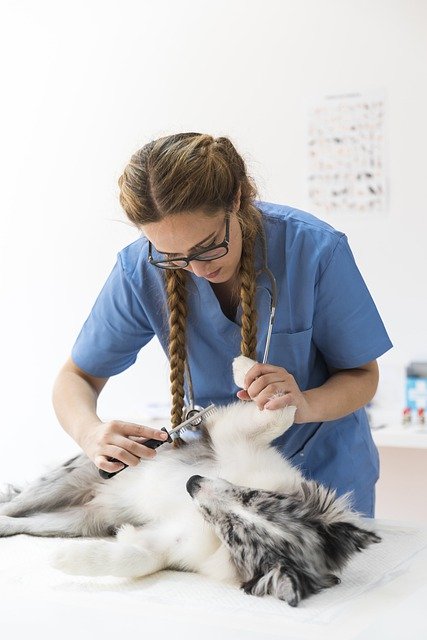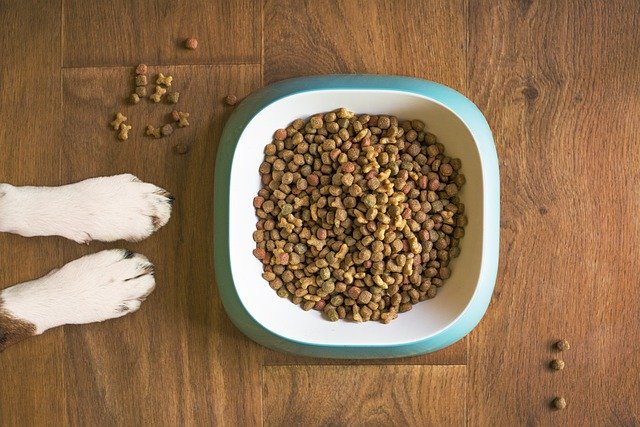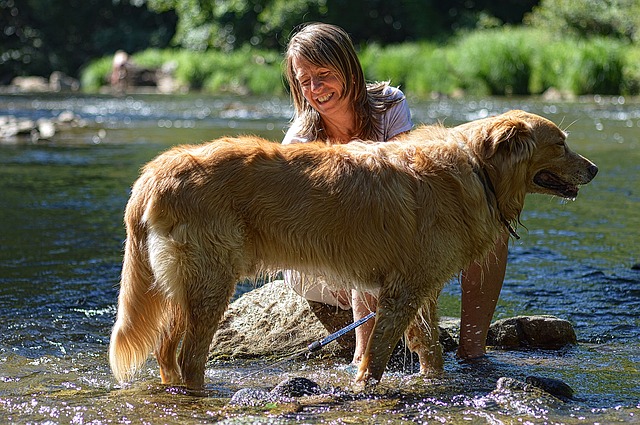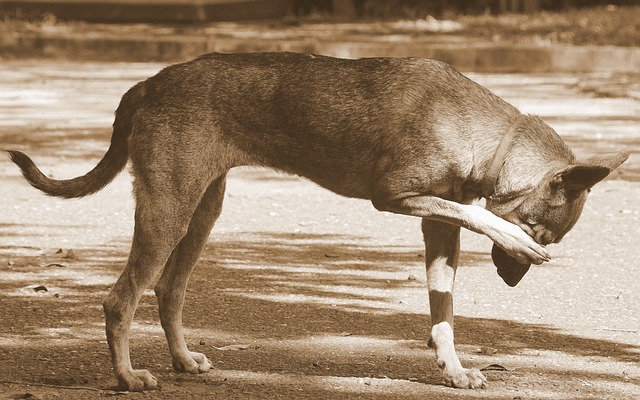![]()
HeelBoyHeel is reader supported. When you buy through any link on our site, we may earn an affiliate commission, but never at any extra cost to you.
Does your dog suffer from dry, itchy skin? If so, you are not alone – this is a really common problem in dogs.
It’s partly because dogs tend to have more sensitive skin than people, so scratch more, but also because they typically spend more time outdoors where they expose themselves to environmental factors that can cause skin dryness, itching, and flaking.
Excessive scratching in dogs is an indication that something is wrong. Dogs, just like us humans, enjoy the odd scratch here and there, but when scratching becomes compulsive there is usually an underlying reason.
So before attempting to home treat dry skin in dogs, it’s important to rule out more serious causes of canine itching such as parasites, fleas, bacterial infections, mites, or underlying anxiety issues.

Scratching Dog Cause 1: Infestation
Fleas, ticks, lice and mites are just some of the tiny creatures that can invade your dog’s hair and cause discomfort by biting and tickling.
This is not a sign of uncleanliness. Even clean, healthy dogs are liable to catch these sort of parasites after coming into contact with other animals with an infestation, or by playing in long grass when mites and ticks are abundant.
The way to stop excessive scratching in these cases is to get rid of the cause of the itch.
Routinely checking your dog’s coat is one of the best ways to catch any sort of infestation early, so you can give the appropriate treatment and stop your dog itching. If you find signs of any unwanted creatures, consult you vet. There are also good over-the-counter treatments available from pet stores, such as anti-flea shampoo that may help get rid of biting pests.

Scratching Dog Cause 2: Nervous Conditions
Stress, excitement, habitual behavior or a compulsive disorder may be to blame for excessive scratching. Much as parrots pull out their feathers when highly strung, dogs may chew, bite and scratch themselves in an effort to obtain relief from stress.
Providing a calming environment can help a nervous dog feel more relaxed. Keeping them away from people who are constantly arguing or shouting, from other loud noises, and from other pets they do not get on with can help reduce anxiety and stop dogs from scratching and biting themselves.
A dog with a severe emotional condition may need help from a canine therapist, if this is recommended by a vet.
Treating a compulsive disorder in your dog alone can be really hard, especially for a pet owner who does not fully understand the issues. So seeking professional advice is always recommended if your dog is showing serious signs of anxiety.
4 Simple Techniques to Relieve Your Dog’s Scratching
In many cases, your dog may not have either fleas or ticks, OR be overly nervous – but still he keeps scratching!
If this is the case, once your dog has a clean bill of health, you can still start working with reducing his symptoms and give him relief from his incessant scratching.
Here are some simple and common sense ways to treat dry skin, and to help relieve that dry, itchy skin in dogs.

1. Assess Your Dog’s Nutrition
Nutrition can play an important role in eliminating dry, flaky skin in a dog.
Be sure that you’re feeding your dog a nutritionally balanced diet. If you’re using commercial dog food, use a premium brand and supplement with Omega-3 fatty acid supplements. Deficiency in essential fatty acids can often present with dry, flaky skin in dogs.
A balanced diet and supplementation with high quality fatty acids can often correct the problem of dry, itchy skin in dogs. Switching from mass produced dog food, which has dubious content, to natural, high quality dog food may solve the problem.

2. Assess Your Dog’s Grooming Routine
Regular grooming is a great way to help reduces itching in dogs – and to find any early signs of unwanted visitors like fleas or ticks that can cause severe itchiness in dogs.
But you do need to be very selective in what grooming products you use.
If you’re using a harsh shampoo on your dog’s skin, it may be stripping the skin surface of essentials oils and aggravating your dog’s dry skin.
Choose an all natural dog shampoo with essential oils formulated for dogs with sensitive skin. You can also purchase canine creme rinses that have added hydrocortisone to relieve severe itching and reduce inflammation.
This can provide welcome relief to a dog persecuted by severe itching due to dry skin or allergies.

3. Assess Your Dog’s Exposure to the Outside
If your dog spends a great deal of time outdoors, he may be manifesting dry, itchy skin due to an allergic reaction to various plants or grasses in your yard.
This is not always the case, and of course your dog should always get plenty of exercise – big dogs especially need to burn of a lot of energy.
But unfortunately dogs can potentially be allergic to a variety of ornamental plants and grasses as well as mold, pollen, and a multitude of other potential allergens.
Determining what your dog is reacting to may be difficult. If the onset of dry, flaky skin in your dog has just started recently, look for any recent plants that may have been planted in your yard and reduce his exposure to the outdoors when possible.

4. Try the Oatmeal Routine
An oatmeal paste can be quite soothing to dry, itchy skin in a dog.
To make an oatmeal salve, mix oatmeal with water to form a thick paste. Apply it to your dog’s skin and place a warm towel over the area. Keep your dog calm for fifteen minutes before removing the towel and the oatmeal paste.
Apply this treatment every day and you should see improvement over time. You can also buy oatmeal dog shampoos that can have a soothing effect on canine skin.
Conclusion
We all like a good scratch, but if your dog is scratching too much, you really should take some steps to alleviate his itching.
By practicing good grooming and nutritional habits, you can help to reduce the symptoms of dry, itchy skin in your dog and make him more happy and comfortable – which of course is what we all want.